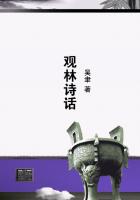Their demand for articles of luxury will increase to a lesser degree, or a demand will develop for things which formerly did not come within the scope of their consumption. The sudden and large-scale increase in the demand for the indispensable means of subsistence will doubtless raise their prices immediately. The consequence: a greater part of the social capital will be employed in the production of necessities of life and a smaller in the production of luxuries, since these fall in price on account of the decrease in surplus-value and the consequent decrease in the demand of the capitalists for these articles. On the other hand as the labourers themselves buy articles of luxury, the rise in their wages does not promote an increase in the prices of the necessities of life but simply displaces buyers of luxuries. More luxuries than before are consumed by labourers, and relatively fewer by capitalists. Voilá tout . After some oscillations the value of the mass of circulating commodities is the same as before. As for the momentary fluctuations, they will not have any other effect than to throw unemployed money-capital into domestic circulation, capital which hitherto sought employment in speculative deals on the stock-exchange or in foreign countries.
Reply to the second formulation: If it were in the power of the capitalist producers to raise the prices of their commodities at will, they could and would do so without a rise in wages. Wages would never rise if commodity prices fell. The capitalist class would never resist the trades'
unions, if it could always and under all circumstances do what it is now doing by way of exception, under definite, special, so to say local, circumstances, to wit, avail itself of every rise in wages in order to raise prices of commodities much higher yet and thus pocket greater profits.
The assertion that the capitalists can raise the prices of luxuries, because the demand for them decreases (in consequence of the reduced demand of the capitalists whose means of purchasing such articles has decreased)would be a very unique application of the law of supply and demand. Since it is not a mere displacement of luxury buyers, a displacement of capitalists by labourers -- and so far as this displacement does occur, the demand of the labourers does not stimulate a rise in the prices of necessities, for the labourers cannot spend that portion of their increased wages for necessities which they spend for luxuries -- the prices of luxuries fall in consequence of reduced demand. Capital is therefore withdrawn from the production of luxury articles, until their supply is reduced to dimensions corresponding to their altered role in the process of social production.
With their production thus reduced, they rise in price -- their value otherwise unchanged -- to their normal level. So long as this contraction, or this process of levelling, lasts and the prices of necessities rise, as much capital is supplied to the production of the latter as is withdrawn from other branches of production, until the demand is satisfied. Then the equilibrium is restored and the end of the whole process is that the social capital, and therefore also the money-capital, is divided in a different proportion between the production of the necessities of life and that of luxury articles.
The entire objection is a bugbear set up by the capitalists and their economic sycophants.
The facts which serve as the pretext for this bugbear are of three kinds:
1) It is a general law of money circulation that, other things being equal, the quantity of money in circulation increases with a rise in the sum of the prices of circulating commodities, irrespective of whether this augmentation of the totality of prices applies to the same quantity of commodities or to a greater quantity. The effect is then confused with the cause. Wages rise (although the rise is rare, and proportional only in exceptional cases) with the rising prices of the necessities of life.
Wage advance are the consequence, not the cause, of advances in the prices of commodities.
2) In the case of a partial, or local, rise of wages -- that is, a rise only in some branches of production -- a local rise in the prices of the products of these branches may follow. But even this depends on many circumstances. For instance that wages were not abnormally depressed and that therefore the rate of profit was not abnormally high; that the market for these goods is not narrowed by the rise in prices (hence a contraction of their supply previous to raising their prices is not necessary), etc.
3) In the case of a general rise in wages the price of the produced commodities rises in branches of industry where the variable capital preponderates, but falls on the other hand in branches where the constant, or fixed, capital preponderates.
We found in our study of the simple circulation of commodities (Buch I, Kap. III, 2) [English edition: Ch. III. -- Ed .] that, though the money-form of any definite quantity of commodities is only transient within the sphere of circulation, still the money transiently in the hands of one man during the metamorphosis of a certain commodity necessarily passes into the hands of another, so that in the first instance commodities are not only exchanged allsidedly, or replace one another, but this replacement is promoted and accompanied by an all-sided precipitation of money. "When one commodity replaces another, the money-commodity always sticks to the hands of some third person. Circulation sweats money from every pore."(Buch I, S. 92.) [English edition: p. 113. -- Ed .] The same identical fact is expressed, on the basis of the capitalist production of commodities, by a portion of capital constantly existing in the form of money- capital, and a portion of surplus-value constantly being found in the hands of its owners, likewise in the form of money.















